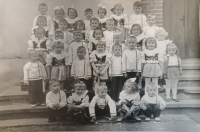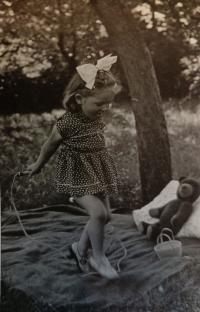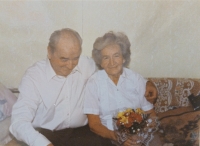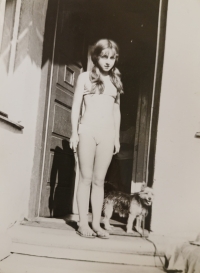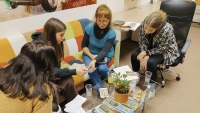"That we could already go to the shop, so we went to the shop, I went to the shop, I mean bread, butter, some basic foodstuffs like that. And as I was coming back, I could see that there was a tank, there was a tank, probably from our house, on that bridge to Kuncice, there was a tank, probably where the gardening shop is now. Just what was it, twenty meters, maybe thirty meters, there was a tank standing, pointing down that main like at that village. And I was, as I was coming out of the shop, the tank started up and stopped by me. And it was a terrible feeling of course, that. It stopped by me and we had to learn Russian compulsorily after the liberation, from the fourth grade onwards Russian was compulsory, so I know Russian, so I understand Russian, but I don't know, I'll say it in Czech I guess. Or I'll tell you how they asked me, 'Děvoška, kuda na Frýdlant?' Like: 'Girl, where are you going to Frýdlant?'
And now you see the cannon, now the people, there are more tanks and armoured personnel carriers behind them. That was a terrible moment for me in that I knew that I must not lie, that we were brought up to believe that honesty and truth, as it was in the battalion, truth wins, that I must not lie. But again, on the other side, I thought, I can't tell the people who are hurting us here, who are occupying us, I can't tell them how to go to Frýdlant, which way to go to Frýdlant, it's not like that. And so I, so it was beating inside of me, but then this, it's stupid to say like that, like a child's patriotism won out, but then I thought terribly, I thought, so I pointed to them and I said like, 'Tuda' and I pointed them back in the direction of the Old Town. That means not towards Frýdlant, but back. They crossed the track and went left again to Old Town and to Frýdek, the whole convoy. Well, I stood there and I ran to Olshina to the river and I sat down there and I just cried, I was just scared. Now if they find out I lied to them, they'll come and burn our house down. You didn't know, we didn't know how the occupiers would behave. Or that they would shoot us. And now, when I go home, I'll be beaten again. Or beaten, we were never beaten, like verbally, that I lied, it was a terrible situation for me. But, because the alder was a short distance away, the river dike was a short distance away from our house and my parents started calling me, so I walked home alongside the ditch just completely afraid of what would happen, what would happen to our family. I was scared that they were going to burn our house down. You didn't know what was going to happen. And they, because the neighbor heard my conversation and saw what I said, so he came to tell my parents and told them that I was fine. So they called me and they welcomed me with open arms. That was so almost touching, it seems to me only now that I acted like that, that actually the fact that I lied was overlooked that actually as a patriot, it's stupid to say that, that I acted like that. And so that was kind of my powerful experience."


